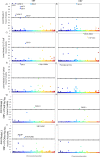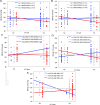Genetic Loci and Novel Discrimination Measures Associated with Blood Pressure Variation in African Americans Living in Tallahassee
- PMID: 28002425
- PMCID: PMC5176163
- DOI: 10.1371/journal.pone.0167700
Genetic Loci and Novel Discrimination Measures Associated with Blood Pressure Variation in African Americans Living in Tallahassee
Abstract
Sequencing of the human genome and decades of genetic association and linkage studies have dramatically improved our understanding of the etiology of many diseases. However, the multiple causes of complex diseases are still not well understood, in part because genetic and sociocultural risk factors are not typically investigated concurrently. Hypertension is a leading risk factor for cardiovascular disease and afflicts more African Americans than any other racially defined group in the US. Few genetic loci for hypertension have been replicated across populations, which may reflect population-specific differences in genetic variants and/or inattention to relevant sociocultural factors. Discrimination is a salient sociocultural risk factor for poor health and has been associated with hypertension. Here we use a biocultural approach to study blood pressure (BP) variation in African Americans living in Tallahassee, Florida by genotyping over 30,000 single nucleotide polymorphisms (SNPs) and capturing experiences of discrimination using novel measures of unfair treatment of self and others (n = 157). We perform a joint admixture and genetic association analysis for BP that prioritizes regions of the genome with African ancestry. We only report significant SNPs that were confirmed through our simulation analyses, which were performed to determine the false positive rate. We identify eight significant SNPs in five genes that were previously associated with cardiovascular diseases. When we include measures of unfair treatment and test for interactions between SNPs and unfair treatment, we identify a new class of genes involved in multiple phenotypes including psychosocial distress and mood disorders. Our results suggest that inclusion of culturally relevant stress measures, like unfair treatment in African Americans, may reveal new genes and biological pathways relevant to the etiology of hypertension, and may also improve our understanding of the complexity of gene-environment interactions that underlie complex diseases.
Conflict of interest statement
The authors have declared that no competing interests exist.
Figures



References
-
- Satcher D, Fryer GE Jr., McCann J, Troutman A, Woolf SH, Rust G. What if we were equal? A comparison of the black-white mortality gap in 1960 and 2000. Health Aff (Millwood). 2005. Mar-Apr;24(2):459–64. - PubMed
-
- Mensah GA, Brown DW. An overview of cardiovascular disease burden in the United States. Health Aff (Millwood). 2007. Jan-Feb;26(1):38–48. - PubMed
-
- Brewster LM, van Montfrans GA, Kleijnen J. Systematic review: antihypertensive drug therapy in black patients. Ann Intern Med. 2004. October 19;141(8):614–27. - PubMed
-
- Havlik RJ, Garrison RJ, Feinleib M, Kannel WB, Castelli WP, Mcnamara PM. Blood pressure aggregation in families. American Journal of Epidemiology. 1979. September 1, 1979;110(3):304–12. - PubMed
-
- Levy D, DeStefano AL, Larson MG, O'Donnell CJ, Lifton RP, Gavras H, et al. Evidence for a gene influencing blood pressure on chromosome 17. Genome scan linkage results for longitudinal blood pressure phenotypes in subjects from the framingham heart study. Hypertension. 2000. October;36(4):477–83. - PubMed
MeSH terms
LinkOut - more resources
Full Text Sources
Other Literature Sources
Medical

